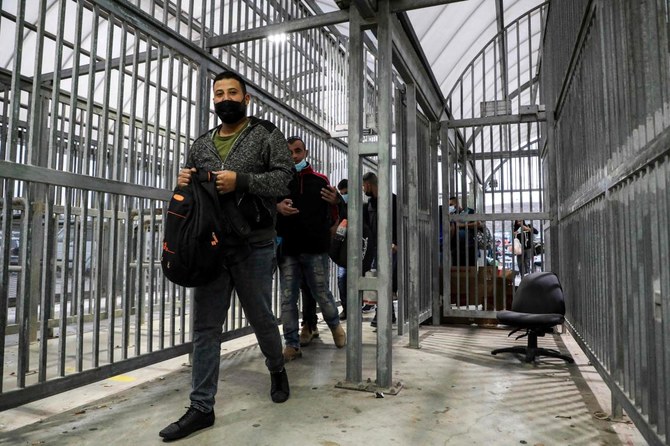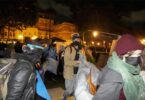JERUSALEM (AFP) : A visa-free travel deal between Israel and the United States has raised hopes of easier journeys for Palestinian-Americans, but many still complain of discrimination by Israeli authorities.
The aim of the reciprocal agreement reached in July was for all Americans “to be recognised by Israel as US citizens and receive equal treatment” regardless of their origins, the US State Department said.
It paved the way for some Palestinian-Americans to finally land at Israel’s Ben Gurion international airport — which has been off limits to most of them for years — rather than travel overland from Jordan.
However, despite progress on paper, Palestinian-Americans have complained of unequal treatment in a series of interviews AFP conducted in the United States and the Palestinian territories.
Hanna Hanania, a board member of the US Palestinian Council advocacy group, described the change at arrivals in Ben Gurion airport as an “improvement for everybody”.
But, as he headed back to the US state of Virginia, he said he faced “total profiling” by Israeli officials who searched his car and insisted on seeing his Palestinian passport.
Jerusalem-born Hanania said he was also directed to a queue for additional security checks where he charged that “discrimination (was) very clear”.
“Almost everybody in line one was speaking Arabic,” he told AFP. “You can very clearly tell that it’s mainly Palestinians or Arabs.”
Israel’s immigration authority did not immediately respond to a request to comment on the complaints.
– ‘Not fair’ –
More than 5,400 Palestinian-Americans have arrived in Israel since July 20, according to the Population and Immigration Authority.
Washington is now contemplating whether to admit Israel into its coveted visa waiver programme, with a decision due by September 30.
New York police officer Haidar Darwish, 38, landed in mid-August and said he was denied a three-month visa without a reason, instead being granted a month-long stay.
“This is not fair,” Darwish said from the West Bank city of Ramallah.
“If they want to proceed with this visa (waiver programme), they need to treat us exactly the way they get treated when they get to the US.”
Several Palestinian-Americans said they had complained about mistreatment to the US embassy in Jerusalem, which declined an AFP interview request.
In the West Bank village of Turmus Ayya, known for its sizeable American population, Abed Ijbar has sought advice from his neighbours before he returns to Tennessee later this month.
“(It’s) the checkpoints from the West Bank to the airport that are driving them crazy,” the 50-year-old said.
Neighbours warned Ijbar to leave hours early, recounting that they had been directed through multiple checkpoints before being searched and finally allowed to cross.
COGAT, the Israeli defence ministry body responsible for civil affairs in the occupied West Bank, said security checks are conducted at crossings and anyone with a tourist visa can pass.
– ‘A normal life’ –
The visa waiver programme has so far focused on those with ties to the West Bank but was on Monday extended to the Israeli-blockaded Gaza Strip.
Palestinian-Americans travelling to Gaza face more restrictions than those in the West Bank, under the rules announced by the US embassy.
There has been disappointment among Gazans living in the United States, who from Monday can fly to Tel Aviv but not travel onwards to the coastal territory.
Lara Abu Hamda, 18, tried unsuccessfully in July to cross from Jordan to Israel for the onward land journey to Gaza.
“I don’t get it,” she said. “I am American. Even though I was born in Gaza and I have a Gaza ID, why would it matter?”
Israel’s immigration authority said entry has been denied to 10 Gazan-Americans, who were not yet included in the scheme, as well as three US citizens from the West Bank.
A Gazan artist living in Chicago, who requested anonymity due to security concerns, said he was held at a detention facility outside Tel Aviv airport.
He ultimately underwent thorough security checks, before being escorted to a flight without any belongings except his credit cards.
In his 30s, the artist said he was still trying to “detox from all the stress and anxiety that I’ve gathered in those 48 hours, being treated like a suspect”.
For those living in Gaza, obtaining permission to leave through Israel is incredibly difficult.
As a result, most make the arduous and costly journey across Egypt’s Sinai Peninsula.
Now, another way has potentially opened for those with US citizenship.
In Gaza City, Saeed Araf Shaath said his family is “very, very excited” at the prospect of finally being able to enter Israel through the Erez crossing as Palestinian-Americans, and fly out from Ben Gurion airport.
Americans living in Gaza must still apply for a travel permit, which COGAT said allows them to travel onwards through “any international border crossing”.
Shaath’s 23-year-old daughter Zainah described why she wants to be able to cross through Erez and board a plane in Ben Gurion: “We need our own freedom, and to have a normal life.”







